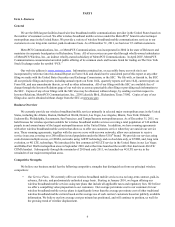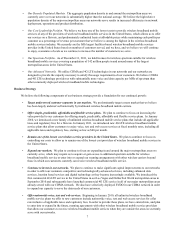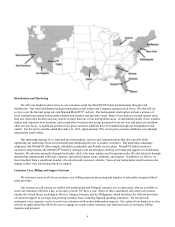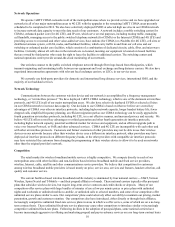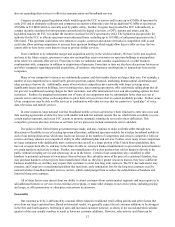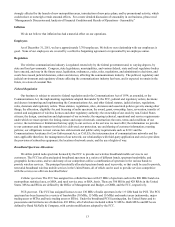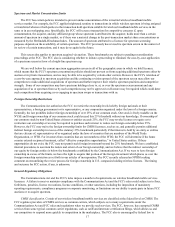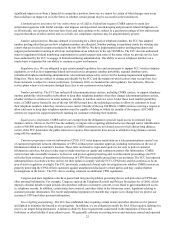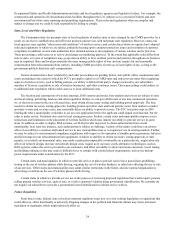Metro PCS 2011 Annual Report Download - page 26
Download and view the complete annual report
Please find page 26 of the 2011 Metro PCS annual report below. You can navigate through the pages in the report by either clicking on the pages listed below, or by using the keyword search tool below to find specific information within the annual report.15
or MSS, spectrum. This satellite spectrum, along with the ancillary terrestrial component, or ATC, that has been granted to
most MSS licensees, may also be used to provide mobile wireless broadband services. Despite these government initiatives to
identify and allocate additional spectrum for mobile wireless broadband services, there is, at present, a spectrum shortage and
there do not appear to be any easy near term solutions. There is no certainty as to whether such additional spectrum will be
made available, the amount of spectrum which might ultimately be made available, any required exclusion zones where the
spectrum may not be used, the timing of the auction of any such spectrum, the process for clearing incumbent users, the likely
configuration of, and conditions that might apply to, any such additional spectrum, or the usability of any of this spectrum for
wireless services competitive with our services or by us. In addition, the National Telecommunications and Information
Administration, or NTIA, has issued a report identifying 155 MHz of spectrum for fast track evaluation and sets a timetable for
making a total of 500 MHz of spectrum available through government coordination and reallocation. See General Regulatory
Obligations - National Broadband Plan. Congress recently enacted legislation which provides the FCC with authority to
conduct incentive auctions for both spectrum currently held by DTV stations and others, and the legislation requires the FCC to
conduct the incentive auctions for DTV spectrum by 2022. Further, Congress may pass legislation or the federal government
may undertake actions or proceedings in the future to reallocate spectrum from government use to private commercial use for
mobile wireless broadband services or to change the rules relating to already licensed spectrum, which may allow new or
existing licensees to provide services comparable to the services we provide.
License term
The broadband PCS licenses held by us have an initial term of ten years, our AWS licenses have an initial license term of
fifteen years, and our 700 MHz Lower Block A license, or 700 MHz license, has an initial term of ten years from June 12,
2009. If we fail to meet an initial construction benchmark in June of 2013 for our 700 MHz license, the license term will be
shortened to June of 2017, and if we do not take meaningful steps toward construction by June 2013, we may be subject to
fines and forfeitures and/or a reduction of our licensed service area. In addition, if we fail to meet the build out requirements by
the end of the license term for our 700 MHz license, we will lose our authority to serve any unserved area within our 700 MHz
license area and also could be subject to fines and forfeitures, including a revocation of our 700 MHz license. Each FCC
broadband spectrum license we have constructed is material to our ability to operate and conduct our business in the area
covered by that license. We also have other licenses, such as microwave licenses, which we use to backhaul traffic from our cell
sites to our switch locations.
Subject to applicable conditions, all of our licenses may be renewed at the end of their terms. Our initial broadband PCS
licenses for San Francisco, Sacramento, Miami and Atlanta were granted in 1997, were renewed in 2007 and are subject to
renewal in January 2017; our AWS licenses were granted in November 2007 and are subject to renewal in November 2021; and
our 700 MHz license was granted in June 2008 and is subject to renewal in June 2019. We intend to file renewal applications
for our licenses when the renewal filing windows open. The next wireless broadband PCS license that needs to be renewed
expires in 2015.
The FCC will award a renewal expectancy with respect to licenses held by broadband commercial mobile radio service,
or CMRS, licensees if the licensee meets specific performance standards. To receive a renewal expectancy, we must show that
we have provided substantial service using such license during our past license term, and have substantially complied with
applicable FCC rules and policies and the Communications Act. If we receive a renewal expectancy with respect to our existing
licenses, it is very likely that the FCC will renew our existing licenses. If we do not receive a renewal expectancy with respect
to our existing licenses, the FCC, in certain instances, may accept competing applications for the license renewal period,
subject to a comparative hearing, and may award the license for the next term to another entity. The FCC also may deny license
renewal applications for cause after appropriate notice and hearing.
In 2011, the FCC released an NPRM proposing to establish more consistent requirements for renewal of licenses, uniform
policies governing discontinuances of service, and to clarify certain construction obligations across all of the wireless service
bands. We are unable to predict with any certainty the likely timing or outcome of this wireless renewal standards proceeding.
The proposed changes to the applicable renewal and discontinuance of service requirements may be applied to existing licenses
that will be renewed in the future. If more stringent requirements are applied retroactively to our existing licenses, the FCC
may determine that prior actions, or inactions, of ours, or of our predecessors in interest, jeopardize the renewal of our licenses.
The FCC has not indicated when it may take action on this NPRM.
Construction Obligations
The FCC has established various construction obligations for wireless licenses with different requirements often applying
to spectrum licensed at different points in time. For example, broadband PCS licensees holding licenses originally granted as 30
MHz licenses must construct facilities to provide service covering one-third of the population of the licensed area within five



